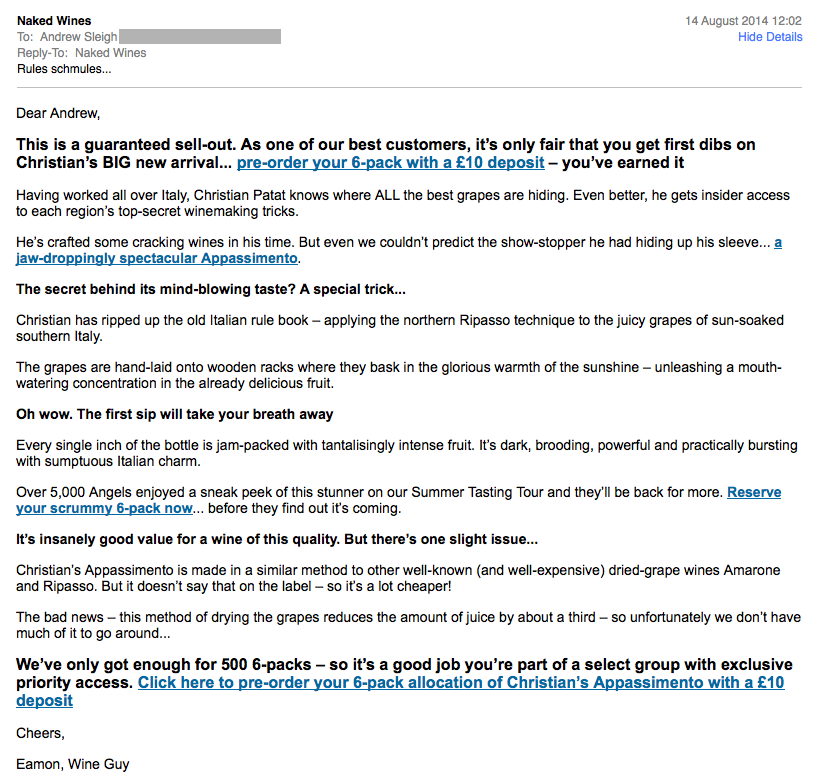Your brand is not my [$friend_name$]
It’s easy to blame Innocent smoothies, who might be the ones who started this trend, but I think the UX, brand, marketing and copywriting people at brands who are doing this now should take responsibility.
Your brand is not my friend. 15 years ago, you could adopt a chummy tone-of-voice and it was disarming. It cut through. Now, it’s the way everyone speaks, and it’s just alienating. So stop doing it. Find an authentic voice for your brand; don’t just copy what once worked for someone else.
It’s hardly news that this approach to branding is now tiresome in its ubiquity. What is interesting – and especially dangerous for the brands that still engage in this behaviour – is that technology, in its brutal reductiveness and clumsy algorithms, cuts against the very friendship brands are trying to strike up with their ‘approachable’ copy.
Here’s a screenshot from the Waitrose product page for Tyrells crisps. The product information box – as with all the products they sell – contains the copy scraped from the back of the packet. No doubt when this was rendered on the packet in a retro artisinal font, the brand manager signed it off without hesitation. Rendered into an interminable string of stereotype-mining, cod-British cliches, the message is fatally undercut. Try reading this without gnawing your own fist:
A smoky seaside special to warm the cockles. Gluten free – just in case you were wondering. Nothing artificial – MSG no thank you. Vegan friendly – free from animals. Beach barbecue seasoned potato crisps. Windbreaks at the ready! Here’s a suitably smoky tribute to the jolly optimism of the English seaside barbecue. Chin up chaps, it might not rain. And if you like these keep your eyes peeled for our magnificent vegetable crisps. Just a few quick potato-shaped words to kick things off. We’re Tyrrells of Tyrells Court Farm and we make fine English crisps from local Herefordshire potatoes. We cook them by hand in small batches and we always leave the jackets on. We reckon they’re rather special – dig in and let us know what you think. Coin Us a Caption! Now, we don’t know about you, but when we see an eccentric old photograph – like the one on the front of this bag – we can’t help but dream up a silly caption. If you’re the same, don’t suffer in silence, unleash your wit at www.tyrrellscrisps.com/caption. After 15 years the spark still hadn’t died for Vera and Dobbin. The Tyrrells Alternative Five-A-Day. Steamed broccoli, herbal tea, sit-ups: nothing terribly wrong with any of those (in moderation). But there is such a thing as taking it too far, you know. Which is why we came up with our own lifestyle guide, an alternative five-a-day. It’s simple list of things to keep your spirits up. Well it works for us! A pot of potato salad in the rain. A flask of hot tea. A game of beach cricket. A good dollop of barbecue relish. A pack of proper English crisps
The cloying chumminess of the copy is only surpassed by the looming inevitability of the caption competition. Yes, they want to be your friend, but they’d rather you did it in a way that moved the needle on their engagement metrics please.
And here’s an email from Naked Wines, who I just signed up with. I used the standard £20-off sweetener everyone gets, so I could hardly be described as a loyal, valuable, or ‘best’ customer. But no, somewhere in the filtering rules of their CRM software, a flag has been set. It even says so in the footer.
We’re sending you this e–mail because you are one of our best customers.
It doesn’t matter how interesting the content might be, this little algorithmic glitch has planted the seed of inauthenticity in my mind. They’re trying to make me feel special (“you’re part of a select group with exclusive priority access”, “you’ve earned it”, etc.) in order to sell me something. Now everything I read from Naked is tainted with that impression.
The rules have changed. Last week, P&G announced it was cutting 100 brands from its portfolio. The old rule for FMCG brands was: Dominate the supermarket shelf. For a company like P&G, a strategy that worked was to saturate very category with their own brands, strike favourable shelf space deals with supermarkets, and build recognition with mass-market advertising. That doesn’t work anymore. You can’t own the shelf on Amazon or Google, it’s infinitely large.
Following Lafley’s return to the helm in 2013, P&G are responding by refocusing on the very big and the emerging brands, and cutting out the unprofitable middle. Lafley has considerable reputation as an innovator – someone who can see when the rules have changed, and has the power to alter the course of an entire company. Not every organisaton or brand has someone like that who can see and respond to changing conditions. But we all contribute to decisions about how our products and services are packaged and communicated to consumers, fans, and collaborators. So let’s treat people with respect, speak authentically, and consider what that means when messages are filtered, personalised, re-rendered and re-published by the technologies that mediate our relationships.

